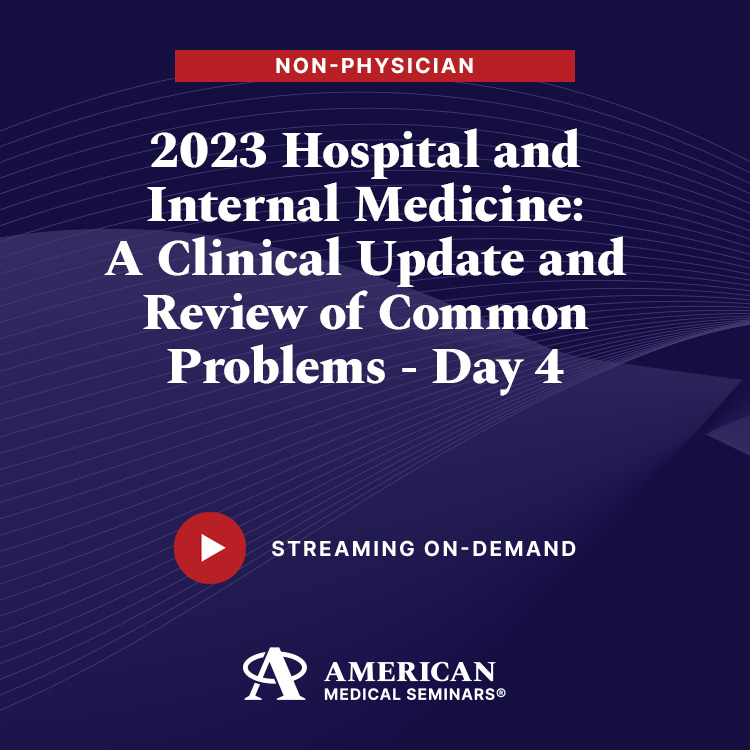Title: 2023 Hospital and Internal Medicine: A Clinical Update and Review of Common Problems – Day 4 (Non-Physician)
Faculty: David A. Horowitz, M.D., Kendal Williams, M.D., M.P.H.
Release Date: 7/1/2023 Expiration Date: 7/1/2026
Day 4
Update on the Management of Stroke and Transient Ischemic Attack (Williams)
Upon completion of this session, the participant should be able to: GL, COMP
- Assess common presentations of cerebrovascular insufficiency.
- Prescribe the initial management of patients with a suspected acute CVA.
- Apply cutting edge strategies and therapies for the management of hemorrhagic and thrombotic strokes.
- Distinguish between stroke and TIA and appropriately assess the patient with TIA for early risk of stroke.
- Formulate an effective post-stroke secondary prevention plan as per the AHA/ASA guidelines.
The Evaluation and Management of Syncope and Vertigo (Williams)
Upon completion of this session, the participant should be able to: GL, COMP
- Appropriately evaluate patients with syncope or vertigo.
- Formulate a diagnostic evaluation strategy of syncope or vertigo that is based on best practices and the 2017 ACC/AHA/HRS guidelines.
- Debate the value of the various diagnostic approaches to the workup of syncope.
- Prescribe an effective therapeutic strategy for the management of both syncope and vertigo per the 2017 ACC/AHA/HRS guidelines.
Delirium, Dementia, and Psychosis – The Diagnosis and Management of the Inpatient with Mental Status Change (Williams)
Upon completion of this session, the participant should be able to: EBM, COMP
- Apply a diagnostic approach to the hospitalized patient with acute mental status change.
- Discuss the differential diagnosis of psychosis in the hospitalized patient.
- Based on a systematic review of the best evidence, formulate an evidence-based management strategy for delirium in the hospital setting.
- Develop an evidence-based screening and treatment protocol for the prevention and management of alcohol withdrawal syndromes.
Practical Approach to Thyroid Disease: 1. Hypothyroidism/Elevated TSH 2. Patient with a Thyroid Nodule (Horowitz)
Upon completion of this session, by applying recommendations from the AAFP, AACE, ACP, ATA, USPSTF, IOM, and ACOG, the participant should be able to: GL, COMP
- Appreciate the role of the screening TSH and what to do with the results.
- Develop a reasonable and cost-effective approach to diagnosing the thyroid nodule.
- Discuss the management of hypothyroidism.
Non-Surgical Approaches to the Patient with Obesity (Horowitz)
Upon completion of these sessions, using multiple research trials as well as applying recommendations from the AGA, NIH – NHLBI, ACP, AHA, ASBS, and ACS, the participant should be able to: GL, COMP
- Review the current popular diets available and marketed to your patients.
- Take into consideration unique needs of the obese patient in order to create a comprehensive approach to the treatment of obesity.
- Explain the basic physiology of obesity.
- Manage the medications available for the treatment of obesity.
- The receipt for any incentive-associated purchase will designate the value of the gift card separately from the cost of the learning activity.
- This incentive may have implications on your tax reporting obligations. Any reimbursed amount must be declared as personal income for tax purposes.

